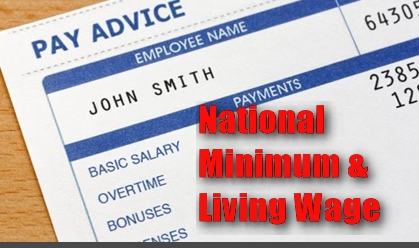“If you pay peanuts, you get monkeys!” – Anon.
This piece of legislation was introduced for the specific purpose of allowing the Government to set a minimum wage rate at which employees should be paid National Minimum Wage (NMW). There are various different methods for calculating NMW, depending on the age of an employee and for apprentices.
The main rate* is currently £7.70 per hour for adult workers (21-24), as of April 2019. There is also a reduced rate of £6.25 per hour for workers aged between 18 and 20 and of £4.35 per hour for workers who are aged under 17, but above compulsory school leaving age of 16.
The rate for apprentices under 19 (or 19 or over and in the first year of their apprenticeship) is £3.90.
Accommodation Offset – a daily deduction from wages where accommodation is provided by the employer (such as a live-in manager or chef or barstaff) – £7.00 per day.
*Rates from 1 April 2019
There are also regulations which set down the rate at which employees should be paid sick pay and pay during statutory leave such as maternity leave and paternity leave.
National Living Wage
The mandatory “National Living Wage” is £8.21 per hour from April 2019 for all workers over the age of 25. Future rates will be set by the Low Pay Commission as the government has set a target of £9.00 per hour by 2020.
The NMW for those aged 21 to 24 will still be in force (sic), as will those for other categories of employees.
This rate of pay should not be confused with the Living Wage Foundation’s current* rate of £10.55 per hour for workers in London and £9.00 per hour for those outside the capital. For more information on the benefits of paying a Living Wage to your staff, visit Living Wage Foundation, Employers’ Advice on their website.
*as of April 2019
Entitlement to the NMW
- if they are paid weekly or monthly, by cheque, in cash or in another way
- if they work full time, part time or any other working pattern
- if they work at your employer’s own premises or elsewhere
- what size the employer is
- where they work in the UK
Employees are entitled to the NMW even if they sign a contract agreeing to be paid at a lower rate. This is regardless of whether they sign of their own free will or because the employer persuades or makes them. The contract will have no legal effect and they must still be paid the proper rate.
The Living Wage
This is an hourly rate set independently and updated annually, The Living Wage, is calculated according to the basic cost of living in the UK. The UK Living Wage is calculated by the Centre for Research in Social Policy, whilst The London Living Wage is calculated by the Greater London Authority.
According to The Living Wage Foundation, which, enjoys cross party support, with public backing from the Prime Minister and the Leader of the Opposition, paying the Living Wage is good for business, good for the individual and good for society.
Employers choose to pay the Living Wage on a voluntary basis.
The current UK Living Wage (outside of London) is £8.75/hour and the current London Living Wage is £10.20/hour.
Penalty For Not Paying NMW
Employers found not to be paying the NMW, after the necessary investigation by HMRC, will be charged a penalty of 100% of the underpayment to each employee up to a maximum penalty of £20,000 per employee.
An underpayment is the difference between the actual wages paid to an employee and the amount s/he should have been paid.
A Notice of Underpayment by HMRC can be used in the civil court to establish a judgement for debt which HMRC can enforce by means of sequestration of bank accounts and distraint on goods.
Company Directors can also be barred from running companies for up to 15 years.
Some publicans offer accommodation as part of a worker’s employment and there are permissible off-sets an employer can make in relation to accommodation, for more information click here.
Top Tip – don’t be tempted to pay less than the National Minimum Wage – not only is it illegal, but according to the results of a report by the National Minimum Wage Low Pay Commission, eight out of 10 people would not use the services of a business if they knew it paid less than NMW while 90 per cent called those employers ‘a disgrace’.
